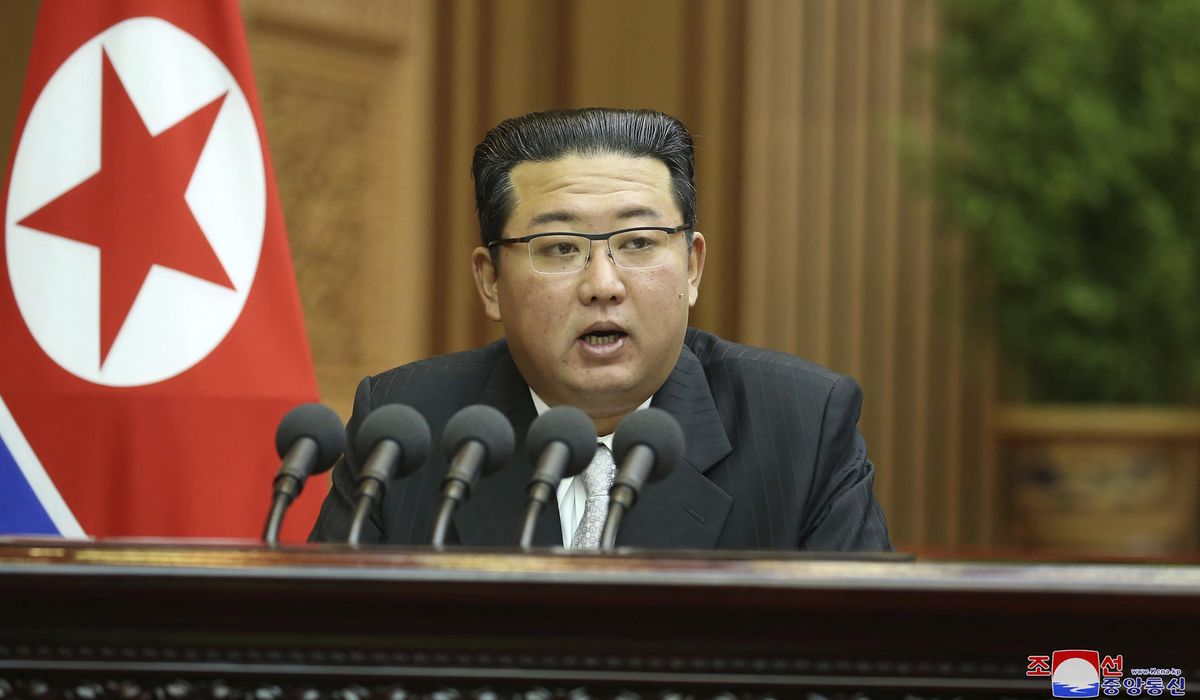
The former top U.S. intelligence official on North Korea says Kim Jong-un’s regime is “disappointed” with Biden administration policy so far, saying Pyongyang likely hoped the new U.S. administration would have delivered a “concrete roadmap” for restarting stalled nuclear talks by now.
Andy Kim, who headed the CIA’s Korea Mission Center at the height of the Trump administration’s high-stakes summits with North Korea in 2018 and 2019, said Tuesday that the Kim regime spent months “patiently waiting to hear what the new U.S. administration’s North Korea policy would look like.”
“I believe they eventually [were] disappointed,” Mr. Kim said in remarks to “The Washington Brief,” a virtual event series hosted by The Washington Times Foundation. He said the Biden administration has so far embraced a “classic middle-ground policy option of calibrated and practical approach” toward Pyongyang.
Others have been more critical, as North Korea has consistently rejected Mr. Biden’s offers to resume direct talks without preconditions this year. Former Secretary of State Mike Pompeo recently called the Biden approach a return to Obama- and Bush-era “Strategic Patience” that he said turns a blind eye to North Korean nuclear and weapons violations.
Mr. Kim pointedly avoided grading the Biden administration approach on Tuesday, offering instead a blunt analysis that the North Koreans expected and hoped the Biden administration would have aligned more with the left-leaning government in South Korea that favors engagement and concessions to the North.
“I think Pyongyang was probably hoping to see a more concrete roadmap from the U.S. side, adopting an action-for-action approach, [while] giving some credit to North Korea for what they have done for the last four years,” he said. “… I heard this many times from North Korean counterparts — that the U.S. side hasn’t really given them credit for what they have done.”
Mr. Kim referred specifically to the Kim regime’s halting intercontinental ballistic missile (ICBM) and nuclear tests since the historic 2018 Singapore summit with Mr. Trump.
North Korea‘s frustration toward the Biden administration may explain recent rhetorical threats and other provocations from Pyongyang — most notably the recent test-launches of several shorter-range missiles.
Mr. Kim, who appeared for “The Washington Brief” with former U.S. North Korea negotiators Ambassadors Joseph DeTrani and Christopher Hill, as well as with Alexandre Mansourov of Georgetown University’s Center for Security Studies, indicated that a range of factors could impact U.S. policy toward Pyongyang in the coming months.
He defined the Biden administration policy thus far as one of “risk management,” as opposed to the “crisis management” approach the Trump administration embraced in 2017 amid a major escalation at the time of North Korean ICBM tests, as well as nuclear detonation that year by the Kim regime.
U.S.-North Korean direct talks have now been stalled for more than two years following a pair of high-stakes leader-level summits under Mr. Trump. The summits captured world attention, but ultimately failed to convince North Korea to abandon the nuclear weapons program or ease the crippling U.S. and international economic sanctions Pyongyang has long criticized.
Mr. Kim, a former longtime CIA officer, suggested that the Biden administration may be content to allow South Korea to steer the policy for the time being. South Korean President Moon Jae-in has recently made diplomatic overtures to the Kim regime and expressed a desire to ink a declaration ending the official state of war with Pyongyang dating back to the 1950s before leaving office next year.
The American intelligence community is engaged in a heated internal debate over whether the U.S. should appeal to China as a potential partner in trying to influence the Kim regime.
China, which shares a border with North Korea, is Pyongyang’s main economic partner and only strategic ally. Beijing is also accused by critics of evading U.N. and U.S. sanctions on North Korea through a network of shady deals that provide goods and cash in exchange for North Korean coal.
The U.S. and South Korea don’t always see eye to eye on what China’s role should be, Mr. Kim said.
“Sometimes we believe China can pressure North Korea on our behalf and sometimes we don’t want China to be involved at all,” he said. “On the other hand, South Korea always sees China as a major player in North Korea relations.”
There is no secret about China’s desire to “be a significant player in this effort,” he added, cautioning that Chinese President Xi Jinping may seek to capitalize on the situation over the coming months to put out the message that he is a more powerful and influential regional power broker than the United States.
Specifically, said Mr. Kim, the U.S. should be wary that Kim Jong-un and Moon Jae-in could come together for a meeting on the sidelines of the upcoming February 2022 Winter Olympics in Beijing.
“Having Xi Jinping brokering some kind of meeting, the three of them,” he said, “that’s the last thing the U.S. would like to see.”
